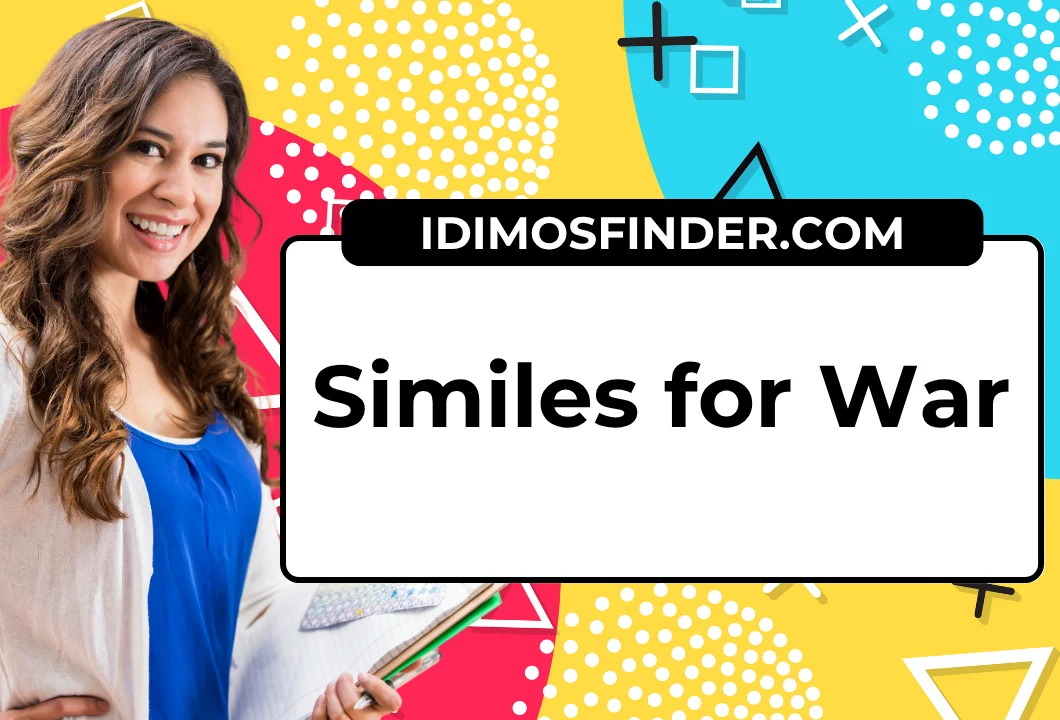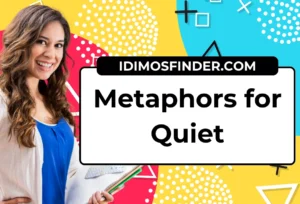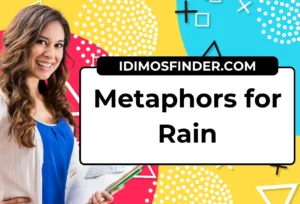War is a complex and emotionally charged subject that has been depicted in countless ways throughout history. The violent clashes and consequences of conflict can be difficult to describe without using vivid comparisons. Similes for war help bring the raw intensity, destruction, and unpredictability of war to life. Whether you’re describing a battle, the chaos of a conflict, or the aftermath, similes allow you to evoke deep emotions and understanding.
1. War is like a storm
Meaning:
It’s sudden, destructive, and uncontrollable.
In a sentence:
The war raged on, like a storm that tore through everything in its path.
Best use:
To describe the chaos and sudden onset of war.
Other ways to say:
- War is like a hurricane, unstoppable and overwhelming.
- War is like a thunderstorm, loud and destructive.
2. War is like a wildfire
Meaning:
It spreads quickly and uncontrollably, consuming everything in its way.
In a sentence:
The conflict spread across the region like a wildfire, engulfing all in its path.
Best use:
To describe how war can escalate rapidly and destroy everything it touches.
Other ways to say:
- War is like an out-of-control fire, burning with no end.
- War is like a blaze, rapidly consuming the land.
3. War is like a monster
Meaning:
It’s frightening, unpredictable, and destructive.
In a sentence:
The war was like a monster, constantly changing its form and terrifying everyone in its wake.
Best use:
To depict the terrifying and uncontrollable nature of war.
Other ways to say:
- War is like a beast, devouring everything in its path.
- War is like a wild animal, hard to predict and harder to contain.
4. War is like a broken mirror
Meaning:
It shatters lives, leaving fragments that are impossible to repair.
In a sentence:
The aftermath of war was like a broken mirror, with no hope of fixing what was lost.
Best use:
To describe the irreversible destruction caused by war.
Other ways to say:
- War is like shattered glass, leaving a trail of destruction.
- War is like a cracked lens, distorting everything it touches.
5. War is like a ticking time bomb
Meaning:
It’s inevitable and ready to explode at any moment.
In a sentence:
The tensions were building, like a ticking time bomb, waiting for the inevitable explosion.
Best use:
To convey the impending danger and uncertainty before a conflict breaks out.
Other ways to say:
- War is like a fuse waiting to be lit.
- War is like an impending storm, ready to break at any moment.
6. War is like a game of chess
Meaning:
It involves strategic moves, planning, and consequences.
In a sentence:
The war unfolded like a game of chess, with each side making calculated moves.
Best use:
To describe the strategic, calculated nature of warfare.
Other ways to say:
- War is like a battle of wits, where each move counts.
- War is like a strategic puzzle, where one wrong move can cost everything.
7. War is like a battlefield of minds
Meaning:
It’s not only physical, but also a mental and emotional struggle.
In a sentence:
The war was like a battlefield of minds, with each side trying to outthink the other.
Best use:
To express the psychological and intellectual challenges of war.
Other ways to say:
- War is like a mental warfare, where strategy and willpower collide.
- War is like a game of psychological endurance, testing every mind involved.
8. War is like a rollercoaster
Meaning:
It’s full of ups and downs, unexpected twists, and intense moments.
In a sentence:
The progress of the war was like a rollercoaster, with constant changes in direction.
Best use:
To describe the unpredictable nature of conflict and the emotional highs and lows.
Other ways to say:
- War is like a fast-paced ride, with sudden drops and sharp turns.
- War is like a whirlwind, spinning out of control at times.
9. War is like an earthquake
Meaning:
It shakes everything to its core, causing widespread damage.
In a sentence:
The declaration of war felt like an earthquake, shaking the foundation of the entire world.
Best use:
To convey the disruptive, foundation-shattering impact of war.
Other ways to say:
- War is like a tremor, unsettling everything it touches.
- War is like a sudden quaking, ripping apart the earth beneath you.
10. War is like a tornado
Meaning:
It causes chaos, destruction, and leaves nothing unchanged.
In a sentence:
The war swept through the country like a tornado, leaving destruction in its wake.
Best use:
To show the devastating and wide-reaching effects of war.
Other ways to say:
- War is like a whirlwind, picking up everything in its path.
- War is like a storm, violently uprooting everything.
11. War is like a dark cloud
Meaning:
It casts a shadow over everything, leaving an oppressive atmosphere.
In a sentence:
The war hung over the land like a dark cloud, clouding everything with uncertainty.
Best use:
To describe the looming, ominous presence of conflict.
Other ways to say:
- War is like a heavy fog, making it hard to see the way forward.
- War is like a black veil, obscuring any hope or clarity.
12. War is like a volcano
Meaning:
It’s destructive, erupting unexpectedly and with great force.
In a sentence:
The outbreak of war was like a volcano, erupting in a moment of fury.
Best use:
To express the explosive, sudden nature of conflict.
Other ways to say:
- War is like an untamed force, exploding with no warning.
- War is like molten lava, burning everything it touches.
13. War is like a maze
Meaning:
It’s complicated, difficult to navigate, and hard to find a way out.
In a sentence:
The peace talks were like a maze, full of dead ends and difficult decisions.
Best use:
To describe the complexity and confusion of trying to resolve war.
Other ways to say:
- War is like a labyrinth, with no clear escape.
- War is like a tangled web, impossible to untangle.
14. War is like a battle of giants
Meaning:
It’s a struggle between massive forces, each equally powerful.
In a sentence:
The war felt like a battle of giants, with both sides equally matched.
Best use:
To describe a large-scale conflict between powerful forces.
Other ways to say:
- War is like a contest of titans, with neither side yielding.
- War is like a clash of empires, each determined to dominate.
15. War is like a virus
Meaning:
It spreads quickly, infecting everything in its path.
In a sentence:
The hatred spread like a virus, infecting entire nations and starting wars.
Best use:
To describe how war or conflict can spread quickly and uncontrollably.
Other ways to say:
- War is like a plague, devastating everything it touches.
- War is like a wildfire, burning through regions without stopping.
16. War is like a giant wave
Meaning:
It’s powerful, unstoppable, and inevitable.
In a sentence:
The advance of the enemy was like a giant wave, crashing toward them with unstoppable force.
Best use:
To describe the overwhelming power and inevitability of war.
Other ways to say:
- War is like a tsunami, overwhelming everything in its path.
- War is like a flood, rising higher with each moment.
17. War is like a game of survival
Meaning:
It’s a fight for existence, where only the strong endure.
In a sentence:
The soldiers faced war like a game of survival, where only the strongest could hope to win.
Best use:
To describe the harsh reality of war and its toll on those involved.
Other ways to say:
- War is like a test of endurance, pushing everyone to their limits.
- War is like a harsh trial, where survival is the only goal.
18. War is like a broken clock
Meaning:
It’s chaotic, unpredictable, and disconnected from reality.
In a sentence:
The war felt like a broken clock, with no sense of time or order.
Best use:
To express the disorienting, confusing nature of war.
Other ways to say:
- War is like an unsolved puzzle, with no clear solution.
- War is like a shattered compass, lost without direction.
19. War is like a violent sea
Meaning:
It’s unpredictable, dangerous, and full of chaos.
In a sentence:
The conflict unfolded like a violent sea, constantly shifting and threatening to consume everyone.
Best use:
To describe the erratic, ever-changing nature of war.
Other ways to say:
- War is like a roaring ocean, unpredictable and full of chaos.
- War is like a stormy sea, tossing everyone in different directions.
20. War is like a deadly game
Meaning:
It’s dangerous, with high stakes, where losing can mean death.
In a sentence:
The soldiers played war like a deadly game, where only the fittest survived.
Best use:
To convey the dangerous and life-threatening aspect of war.
Other ways to say:
- War is like a game of life and death, with no guarantees.
- War is like
a cruel contest, where losing means everything.
21. War is like a train crash
Meaning:
It’s inevitable, destructive, and often catastrophic.
In a sentence:
The conflict was like a train crash, a slow and inevitable disaster waiting to happen.
Best use:
To describe the inescapable and devastating consequences of war.
Other ways to say:
- War is like a head-on collision, unavoidable and catastrophic.
- War is like a ticking bomb, waiting to explode with destructive force.
Conclusion
War is one of the most intense and life-altering events in human history. Whether sudden or inevitable, it causes destruction, chaos, and profound emotional and physical consequences. Through these 25 similes for war, we are reminded of the power of language to express complex feelings and experiences. By using these similes, we gain a deeper understanding of the many facets of war, and how it can be depicted in vivid, meaningful ways.












